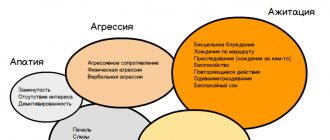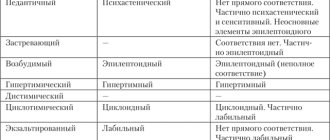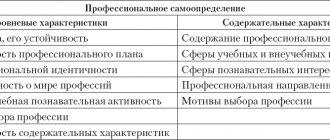Authoritarian style of teaching
The teacher considers his students to be objects of influence, and not equal partners in activities. The teacher separates himself both from the teaching staff and from each child individually.
His main methods of influencing students are teaching, ordering, and such a teacher always controls the fulfillment of his assignments independently and quite strictly, and not always quite correctly. They need complete and unquestioning submission from their students. And they do not consider it necessary to explain the reasons for their orders, prohibitions, restrictions and permissions.
From the point of view of personality psychology, teachers with an authoritarian style of activity are often emotionally cold; they are strong-willed people with a strong character. At the same time, many people are dissatisfied with their professional activities.
With this style of influence, students suffer. They become withdrawn and no contact is established with the teacher, which worsens the children’s academic performance and their desire to learn new things.
Some students try to resist such influence, go into conflict, and as a result, their strength is spent on protecting the negative influence of the teacher instead of heading in the right direction. Most children lose self-confidence and independence, and displays of aggression are common.
Democratic style of pedagogical activity
This style is simply not possible without the teacher’s love for children, his high moral qualities, and professionalism. All this is the key to the successful development of a child’s personality.
Such a teacher is friendly to his students, patient and tolerant; he strives to build subject-subject relationships. Tries to create a business-like and at the same time warm, calm atmosphere in the classroom.
Teachers of the democratic style greatly value independence in children; they resolve many issues with their students, often trusting them to make their own choices and defend their opinions. At the same time, we are not talking about indifference: children’s rights are not infringed, but they clearly understand what responsibilities are assigned to them, and there is unobtrusive control. It is based on a sense of care and responsibility, and therefore is taken for granted by students. In addition, the teacher considers it normal and even necessary to explain why one thing should not be done, but another should be done, and the children listen to this.
Teaching styles.
Expand according to V.L.
Drankov. Powerful, emotional, rational, creative.
Learning styles are determined by the dominance of a certain group of methods in the general system of teaching methods and techniques. They act as a way of the teacher’s attitude towards the ongoing pedagogical activities and communication.
Reproductive style
training. The main feature of the reproductive style is to convey a set of obvious knowledge to students. The teacher simply presents the content of the material, and the level of its mastery will be checked. The main activity of the teacher is reproduction, which does not allow alternatives.
Creative style
training. Its core is to stimulate students to be creative in cognitive activity. As well as teacher support for the initiatives of their students. At the same time, the teacher selects the content of the educational material according to the problem criteria.
Emotional-value style
teaching ensures the personal inclusion of students in the educational process at the level of empathic understanding and value-semantic perception of educational material and the spiritual and moral image of the teacher himself. This is possible only with the emotional openness of the teacher and sincere interest in his subject. This style presupposes the presence of empathic abilities in the teacher, as well as the ability to organize the educational process dialogically.
Emotional-improvisational
style. Such a teacher constructs an explanation of educational material in a logical and interesting way, but he often lacks dialogical contact with students. In addition, the teacher focuses on a number of strong students, ignoring the rest.
Emotionally methodical
style. The teacher is characterized by a focus on the process and result of learning, adequate planning of the educational process, control of the knowledge and skills of all students. Such a teacher is distinguished by efficiency. He often changes types of work in class and practices collective discussions. The teacher uses a rich arsenal of methodological techniques, focusing students’ attention on the essence of the subject, without overusing bright but superficial images.
Reasoning - improvisational
style. The teacher is characterized by an orientation towards the learning process and results, adequate planning of the educational process, and a combination of intuitiveness and reflectivity. The teacher is less inventive in choosing and varying teaching methods; he is not always able to ensure a high pace of work in the lesson, but provides students with the opportunity to formulate a detailed answer. Teachers of this style are less sensitive to changes in situations in the classroom, and they lack narcissism. They are characterized by traditionalism and caution in their actions.
Reasoning - methodical
style. Focusing primarily on learning outcomes and adequately planning the educational process, a teacher with RMS is conservative in the use of means and methods of pedagogical influence and interaction with students. High methodologicalness is combined with a standard set of teaching methods, preference for students' reproductive activities, and rare collective discussions. During the survey process, such a teacher pays special attention to weak students. In general, he is characterized by reflectivity, low sensitivity to changes in the situation in the lesson, and caution in actions and deeds.
Date added: 2016-11-28; ;
SEE MORE:
Source info
Drankov.
Powerful, emotional, rational, creative.
Learning styles are determined by the dominance of a certain group of methods in the general system of teaching methods and techniques. They act as a way of the teacher’s attitude towards the ongoing pedagogical activities and communication.
Reproductive style
training. The main feature of the reproductive style is to convey a set of obvious knowledge to students. The teacher simply presents the content of the material, and the level of its mastery will be checked. The main activity of the teacher is reproduction, which does not allow alternatives.
Creative style
training. Its core is to stimulate students to be creative in cognitive activity. As well as teacher support for the initiatives of their students. At the same time, the teacher selects the content of the educational material according to the problem criteria.
Emotional-value style
teaching ensures the personal inclusion of students in the educational process at the level of empathic understanding and value-semantic perception of educational material and the spiritual and moral image of the teacher himself. This is possible only with the emotional openness of the teacher and sincere interest in his subject. This style presupposes the presence of empathic abilities in the teacher, as well as the ability to organize the educational process dialogically.
Emotional-improvisational
style. Such a teacher constructs an explanation of educational material in a logical and interesting way, but he often lacks dialogical contact with students. In addition, the teacher focuses on a number of strong students, ignoring the rest.
Emotionally methodical
style. The teacher is characterized by a focus on the process and result of learning, adequate planning of the educational process, control of the knowledge and skills of all students. Such a teacher is distinguished by efficiency. He often changes types of work in class and practices collective discussions. The teacher uses a rich arsenal of methodological techniques, focusing students’ attention on the essence of the subject, without overusing bright but superficial images.
Reasoning - improvisational
style. The teacher is characterized by an orientation towards the learning process and results, adequate planning of the educational process, and a combination of intuitiveness and reflectivity. The teacher is less inventive in choosing and varying teaching methods; he is not always able to ensure a high pace of work in the lesson, but provides students with the opportunity to formulate a detailed answer. Teachers of this style are less sensitive to changes in situations in the classroom, and they lack narcissism. They are characterized by traditionalism and caution in their actions.
Reasoning - methodical
style. Focusing primarily on learning outcomes and adequately planning the educational process, a teacher with RMS is conservative in the use of means and methods of pedagogical influence and interaction with students. High methodologicalness is combined with a standard set of teaching methods, preference for students' reproductive activities, and rare collective discussions. During the survey process, such a teacher pays special attention to weak students. In general, he is characterized by reflectivity, low sensitivity to changes in the situation in the lesson, and caution in actions and deeds.
Date added: 2016-11-28; ;
SEE MORE:
Teaching styles.
Expand according to V.L. Drankov.
Powerful, emotional, rational, creative.
Learning styles are determined by the dominance of a certain group of methods in the general system of teaching methods and techniques. They act as a way of the teacher’s attitude towards the ongoing pedagogical activities and communication.
Reproductive style
training. The main feature of the reproductive style is to convey a set of obvious knowledge to students. The teacher simply presents the content of the material, and the level of its mastery will be checked. The main activity of the teacher is reproduction, which does not allow alternatives.
Creative style
training. Its core is to stimulate students to be creative in cognitive activity. As well as teacher support for the initiatives of their students. At the same time, the teacher selects the content of the educational material according to the problem criteria.
Emotional-value style
teaching ensures the personal inclusion of students in the educational process at the level of empathic understanding and value-semantic perception of educational material and the spiritual and moral image of the teacher himself. This is possible only with the emotional openness of the teacher and sincere interest in his subject. This style presupposes the presence of empathic abilities in the teacher, as well as the ability to organize the educational process dialogically.
Emotional-improvisational
style. Such a teacher constructs an explanation of educational material in a logical and interesting way, but he often lacks dialogical contact with students. In addition, the teacher focuses on a number of strong students, ignoring the rest.
Emotionally methodical
style. The teacher is characterized by a focus on the process and result of learning, adequate planning of the educational process, control of the knowledge and skills of all students. Such a teacher is distinguished by efficiency. He often changes types of work in class and practices collective discussions. The teacher uses a rich arsenal of methodological techniques, focusing students’ attention on the essence of the subject, without overusing bright but superficial images.
Reasoning - improvisational
style. The teacher is characterized by an orientation towards the learning process and results, adequate planning of the educational process, and a combination of intuitiveness and reflectivity. The teacher is less inventive in choosing and varying teaching methods; he is not always able to ensure a high pace of work in the lesson, but provides students with the opportunity to formulate a detailed answer. Teachers of this style are less sensitive to changes in situations in the classroom, and they lack narcissism. They are characterized by traditionalism and caution in their actions.
Reasoning - methodical
style. Focusing primarily on learning outcomes and adequately planning the educational process, a teacher with RMS is conservative in the use of means and methods of pedagogical influence and interaction with students.






